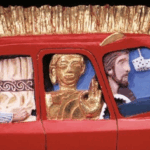It is a cool and cloudy Perth evening. We are setting up some stalls in the cloister-like entrance of the University of Western Australia’s Winthrop Hall, where a concert commemorating the 70th Anniversary of the bombing of Hiroshima is soon to take place.
We are a rag-tag bunch of activists: Doctors for the Prevention of War, the Anti-Nuclear Alliance, the Red Cross, the Conservation Council of WA, the Winter Arts festival, and the Uniting Church in Western Australia’s Social Justice Unit! Proudly I place our banner bearing the words ‘Peace – Justice –Environment’ alongside the others.
Much of the work we do around Australia as the Uniting Church—as congregations, presbyteries and synods and through justice teams and staff—is done in partnership with other organisations who are also concerned about the same issues. Our partners come from a wide range of civil society groups and activists—unions, environmental organisations, Aboriginal and Torres Strait Islander groups, welfare agencies, community groups, schools and universities, and many other ecumenical and church groups and people of different faiths. In each case, we are able to find common ground despite our differences. Our partners are sometimes surprised and often pleased to find that the Church cares about the issues that matter to them. They value our solidarity with them.
These partnerships lead me to reflect on the passage from Luke 9:49-50.
John answered, ‘Master, we saw someone casting out demons in your name, and we tried to stop him, because he does not follow with us. But Jesus said to him, ‘Do not stop him; for whoever is not against you is for you.’ (NRSV)
The context of Luke chapter 9 is the disciples trying to understand Jesus’ message about the realm of God. They are really struggling to turn around their expectations on a number of issues. Peter’s declaration about Jesus as Messiah is countered by the command to follow Jesus into a cross-bearing witness (9:18-27). The wonder of the transfiguration is countered by the disciples failing to heal the child who is said to have a demon (9:37-42). The disciples are found fighting about who is the greatest and Jesus counters again with the example of a child being the greatest (Luke 9:46-48). Then the disciples want to draw boundaries about who can and can’t work wonders in the realm of God and in the name of Jesus, and again Jesus counters with a teaching about finding friends across themboundaries they want to define.
The business of cross-bearing in today’s world is a risky business, just as it was for Jesus. In Luke 9, Jesus proclaims the task he has been given—to challenge the powers of his day and risk rejection by “elders, chief priests, and scribes” and even death—in order that the realm of God could break through. James Alison’s theology of Jesus as the archetypical victim of the human tendency to make false peace by singling out and eliminating those who we can blame for all our troubles offers fresh insight into this costly work. When Jesus returns in resurrection to those who rejected him, he is modelling a new way of peace — the transformation of enemies by love and forgiveness.
Alison’s work helps us understand that we no longer have to continually re-enact this archetypical story—we can offer ‘dignity for all’ and stop the scapegoating and the blaming, the excluding and the rejecting. Many of our culture’s favourite stories are based on this tendency to identify the ‘baddy’ and the troublemaker and, often after much conflict, eliminate them in some way. The gospel story should lead us to reject this paradigm and replace it with stories of redemption, renewal and hope.
The Uniting for Peace statement, adopted by the Uniting Church Assembly in 2003, affirms that “God calls all Christians to be peacemakers” and promises to “work together for peace, justice and reconciliation at the local, national and global level” and “embrace creative approaches to peacebuilding which are consonant with the spirit of the Gospel”.
A commitment to finding creative ways of making peace will require us to make friends of those who are also in the peacemaking, peace-witnessing, conflict resolution and justice-affirming parts of our society and invite them to join with us in turning enemies into friends, loving the unlovely, and caring for those who are most powerless in our society.
Over the years we have found that this ‘creative peacemaking’ has led us from conducting seminars about how to overcome violence in our language and in our church practices, to standing on picket lines and holding prayer vigils in the offices of parliamentarians. We have presented petitions, held multi-faith ceremonies and visited prisons. We have made paper cranes, and stood on windy street corners asking workers hurrying to their lunches to stop and reflect about the death of thousands of people in Hiroshima.
Have you looked around your community to find people who are also working for peace? Who could you build alliances with in this work of bringing in the realm of God?
By joining them at the forefront of their work, you can take the message of Jesus the peacemaker with you and they might find that the realm of God is closer than they think!
Eira Clapton
This is a theological reflection from the UnitingJustice International Day of Peace resources.
GO TO THE WEBSITE TO DOWNLOAD THE INTERNATIONAL DAY OF PEACE RESOURCES











